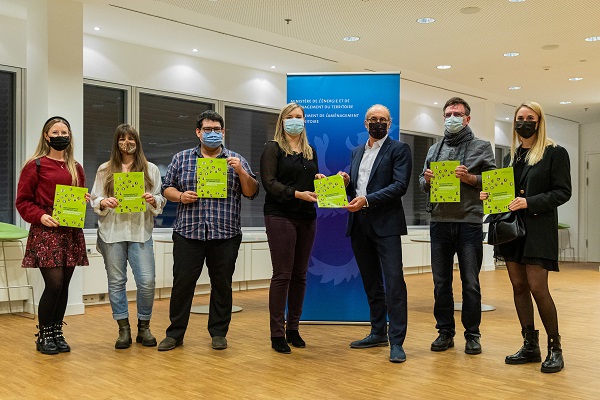 Claude Turmes, Luxembourg's Minister for Energy & Spatial Planning, surrounded by members of the Biergerkommitee Lëtzebuerg 2050;
Credit: MEA, DATer
Claude Turmes, Luxembourg's Minister for Energy & Spatial Planning, surrounded by members of the Biergerkommitee Lëtzebuerg 2050;
Credit: MEA, DATer
The "Biergerkommitee Lëtzebuerg 2050", the citizens' committee set up as part of an international consultation aimed at imagining how Luxembourg could achieve carbon neutrality by 2050, has presented 44 proposals for a successful transition to carbon neutrality.
As part of the "Luxembourg in Transition" project, launched in June 2020, Luxembourg's Ministry of Energy and Spatial Planning wanted to integrate members of the public into the work of the international teams of architects and town planners in order to enable them to discuss openly and independently the challenges and issues that arise in the field of ecological transition and its impact on the territory of the Grand Duchy.
After a year of immersion in the subject, the citizens' committee presented this week the fruit of their work to Claude Turmes, Minister for Energy and Spatial Planning, in the presence of Carole Dieschbourg, Minister of the Environment, Climate and Sustainable Development, Henri Kox, Minister for Housing, and Franz Fayot, Minister of the Economy.
The citizens' committee, made up of 30 participants (25 residents, five cross-border workers; sixteen women, fourteen men), first met in January 2021. They then attended twelve public digital conferences on themes such as climate, biodiversity, urban planning, cross-border cooperation and economic models. Each session was followed by an internal debate behind closed doors. In the second half of 2021, the committee met seven times to analyse the information available and to develop its own recommendations, resulting in a document summarising all of its work.
"I wanted the committee to become, throughout the process, a true laboratory of participatory and co-creative democracy", explained Minister Turmes.
Nine transition principles and 44 recommendations
In its introduction, the Biergerkommitee Lëtzebuerg 2050 emphasised what its members believed must constitute the framework of the government's action to succeed in the transition to carbon neutrality, namely democratic legitimacy, urgency and equity. The committee also analysed the assets but also the obstacles of the Grand Duchy on the path of its transition which, according to the committee, must be taken into consideration for public action to be truly effective. After intense internal discussions, the members agreed on 44 recommendations in the following areas: governance, spatial planning and urban development, mobility, soil protection, architecture, water protection, sustainable agriculture and biodiversity, economy and citizens information.
According to the Ministry of Energy and Spatial Planning, this work could serve as inspiration within the framework of the new master in spatial planning and will henceforth constitute a methodological reference for the initiative launched by Luxembourg's Prime Minister with the establishment of the Klima Biergerrot (citizens' climate council).
Minister Turmes thanked all the committee members for their dedication and commitment throughout the consultation process. In view of the conclusions set out in their document, he highlighted that "the committee's objective of working autonomously in complete impartiality has been achieved: each member, free from any political constraint and in complete independence, was able to discuss the role of land use planning to not only deal with, but above all to provide answers and concrete solutions to climate change and its undeniable impact on the territory and its natural resources".








